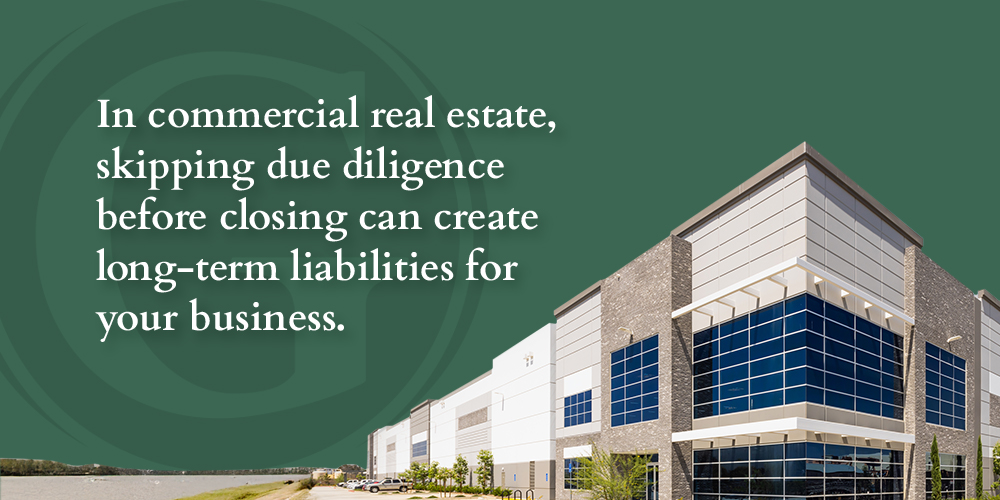What to Look for Before Closing a Commercial Real Estate Transaction

Buying or leasing commercial property is one of the most important decisions a business owner will make. Whether you are opening a retail location in downtown Naperville, buying an office building in DuPage County, or expanding your company’s warehouse operations, the details of the real estate transaction matter.
Commercial real estate is not like buying a house. These deals are complex, heavily negotiated, and filled with potential pitfalls. Rushing to close without careful review can expose you to financial losses, legal disputes, and unexpected liabilities. Avoid these outcomes by calling our Naperville, IL business law attorney today.
Ten Things to Look For When Closing a Commercial Real Estate Transaction
Title and Ownership Checks
The first step of buying or renting commercial real estate is confirming who actually owns the property and whether there are any claims against it. A title search uncovers mortgages, liens, easements, or restrictions attached to the property.
If a contractor, lender, or government agency has a lien, you could be responsible for it if it is not cleared before closing. Likewise, an easement gives someone else the right to use part of the property. If there are any encumbrances, these can limit how you use the property and may affect future development plans. Reviewing and resolving these issues before closing protects you from disputes after the deal is done.
Commercial Zoning and Land Use
In Naperville, zoning laws control how property can be used. You need to verify that the property’s zoning classification matches your intended use. For example, retail sales may not be permitted on a land parcel zoned for light industrial use.
If zoning changes or variances are required, you must factor in the time, cost, and uncertainty of that process. Skipping this step could leave you with property that cannot legally support your business operations.
Environmental Concerns
Environmental liability is one of the most overlooked risks in commercial real estate. Under federal and Illinois law, a property owner can be held responsible for cleaning up contamination, even if the pollution occurred years before purchase.
That is why an environmental site assessment is essential. A Phase I assessment reviews the property’s history, while a Phase II may include soil and groundwater testing. Identifying problems before closing gives you the opportunity to negotiate remediation or walk away from a risky deal.
Lease Agreements and Tenant Issues
If you are purchasing a building with tenants already in place, review every lease carefully. The income stream from tenants may be part of the property’s value, but leases also carry obligations.
Key questions include:
- How long are the leases, and what are the renewal options?
- Are tenants paying market rates?
- Who is responsible for maintenance, repairs, and property taxes?
- Do any tenants have rights of first refusal to purchase or expand into additional space?
These details affect both your cash flow and your flexibility as an owner.
Financing Terms
If you are borrowing to purchase commercial property, loan terms can make or break the deal. Interest rates, prepayment penalties, and covenants (promises you must fulfill as part of the loan) should all be reviewed.
Business owners sometimes focus only on the purchase price and overlook financing conditions. A loan that looks attractive at first may include restrictions on additional borrowing, requirements for insurance, or limitations on how you operate the property. These terms must be fully understood before closing.
Physical Condition of the Property
A thorough inspection is critical. Unlike residential real estate, commercial property transactions often operate under the principle of “buyer beware.” That means the seller may not be required to disclose defects.
Hiring qualified inspectors and engineers to examine the roof, structure, electrical systems, plumbing, and HVAC can uncover problems that would cost hundreds of thousands of dollars to fix later. It is much easier to negotiate repairs or credits before closing than after the deal is finalized.
Permits and Compliance
Commercial properties must meet state and local requirements for occupancy, safety, and accessibility. Before closing, confirm that the property has valid permits and complies with building codes, fire safety rules, and the Americans with Disabilities Act (ADA). Noncompliance can result in costly renovations or even prevent you from operating your business until problems are fixed.
Taxes and Operating Expenses
Commercial properties come with ongoing costs beyond the purchase price. Property taxes, assessments, insurance, and maintenance expenses must all be factored into your budget.
In Illinois, property taxes can be substantial. Reviewing past tax bills and projected assessments helps you avoid surprises. If the property is part of a larger development or association, you may also be responsible for common area maintenance fees.
Contracts and Service Agreements
Many commercial properties have service contracts in place for things like landscaping, snow removal, security, and waste disposal. Before closing, find out whether these contracts will transfer to you as the new owner and whether they make sense for your operations.
Negotiation of Key Terms
Commercial real estate deals are highly negotiable. Purchase agreements and leases often include complex terms related to closing conditions, warranties, dispute resolution, and remedies if the deal does not go through. Having an experienced business law attorney review these documents ensures that your interests are protected and that you do not agree to terms that favor the other party.

Why You Need an Experienced Attorney for Commercial Real Estate Transactions
Closing a commercial real estate transaction without legal review is risky. The investment is often one of the largest expenses for a business, and mistakes can create long-term financial problems. An attorney with decades of experience in both law and business understands the pressures business owners face and can see risks that others might overlook.
Local legal guidance is especially important, where local rules, zoning boards, and government agencies all play a role in property use and development. Working with someone who has built a private practice and runs a business provides insight into both the legal and practical sides of these transactions.
Contact a Naperville, IL Commercial Leasing Attorney
If you are preparing to buy or lease commercial property, take the time to review every detail before closing. A Naperville, IL business law attorney at Gierach Law Firm can help you navigate title, zoning, environmental issues, financing, and contracts.
We have the perspective of both an experienced lawyer and a business owner. With more than 30 years of practice, we provide trusted guidance to help you protect your investment and secure your future. Call 630-756-1160 to learn more about how we can help with your next transaction.
Practice Areas
Archive
+2026
+2018
+2016
Please note: These blogs have been created over a period of time and laws and information can change. For the most current information on a topic you are interested in please seek proper legal counsel.














